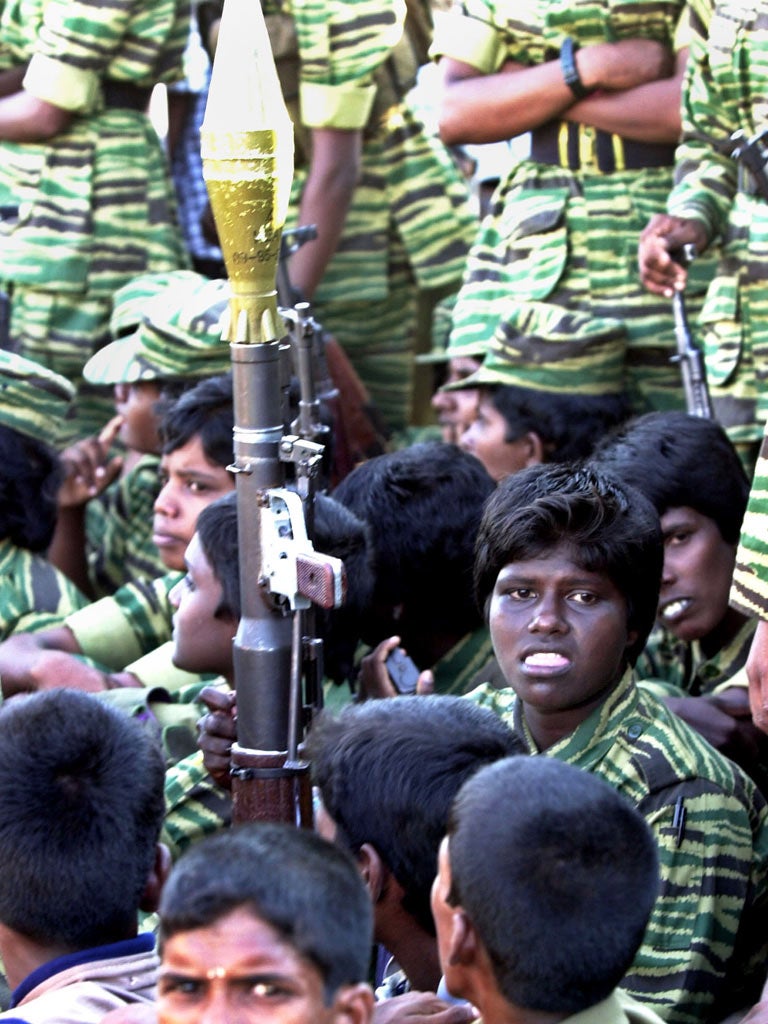Tamil rebels recruited children for last stand against Sri Lankan army

Tamil rebels holed up in ever-diminishing territory in northern Sri Lanka forcibly recruited children to take part in final defences against government troops, according to a former senior official. Some of the youngsters were sent to fight with just one day's basic training. A number of civilians who tried to escape to the government side were shot.
The official, who held a non-military position with the Liberation Tigers of Tamil Eelam (LTTE), said that in the spring of 2009, the rebels found themselves in an ever-worsening situation that led them to step up their forced recruitment of civilians between the age of 14 and 55. He said more than 300,000 civilians had intentionally been held to provide cover for the LTTE fighters.
"There was no age discrimination. One day's training and then [they would] get sent to the war front," said the former official, who said his own child had been forcibly recruited, but that he was able to escape towards government troops. Asked if he believed the rebels committed war crimes, the former official said: "There were many war crimes during that last time. The civilians knew [what was happening]. They could not move out of LTTE control. Some people who tried to leave were shot."
The testimony from the official, who asked that neither his identity nor the location of the interview be revealed, provides an important insight about the final stages of the war, which resulted in the crushing of the LTTE and the killing of most of its leaders. Earlier this year, a report by the UN said there were "credible allegations" that both the government troops and the LTTE committed war crimes in those last weeks and days. It said tens of thousands of civilians may have been killed. The Sri Lankan government has denied the allegations and repeatedly rejected calls for an independent investigation.
The official also provided an insight into how the LTTE's leader, Velupillai Prabhakaran, seized on the ambitions of Tamil nationalists, including those who were opposed to violence. "He was a good leader. In all things he was adamant, he was focused. There is no chance for another uprising now. There is no leadership," he said. "The Tamil diaspora can provide some political pressure, but anything else is not possible."
Yet the official conceded that Prabhakaran's unquestioning self-belief had also led to several tactical errors, including his insistence that Tamils boycott the 2005 election. This move indirectly led to victory narrowly being secured by Mahinda Rajapaksa, who within a year would decide to launch military operations to crush the LTTE.
Asked about the later tactic of the LTTE to target civilians and even schoolchildren, the official said not everyone within the movement supported the move and were aware of the international backlash it would bring. "That was why they denied it," said the official. As to why the tactic was adopted, he said: "They wanted to create a panic among the Sinhala people."
The official, who said his involvement with the LTTE dated from 1995, a date when the organisation lost control of the city of Jaffna and moved its headquarters to Kilinochi, claimed that since the end of the war, the government had done little in terms of promoting reconciliation.
In two local elections held in the north since the conclusion of the war in May 2009, Tamil parties easily defeated the coalition of the government.
"The main thing is to find a political solution," said the official, who is due before a court next year to face charges relating to his role with the LTTE. "The war is over, the LTTE is defeated. So far there has been no signal about a political solution. They say they are having negotiations, but people are not satisfied."
He added: "We need a political solution, but without the support of the Sinhala people, the Tamil people cannot get a political solution."
Subscribe to Independent Premium to bookmark this article
Want to bookmark your favourite articles and stories to read or reference later? Start your Independent Premium subscription today.

Join our commenting forum
Join thought-provoking conversations, follow other Independent readers and see their replies